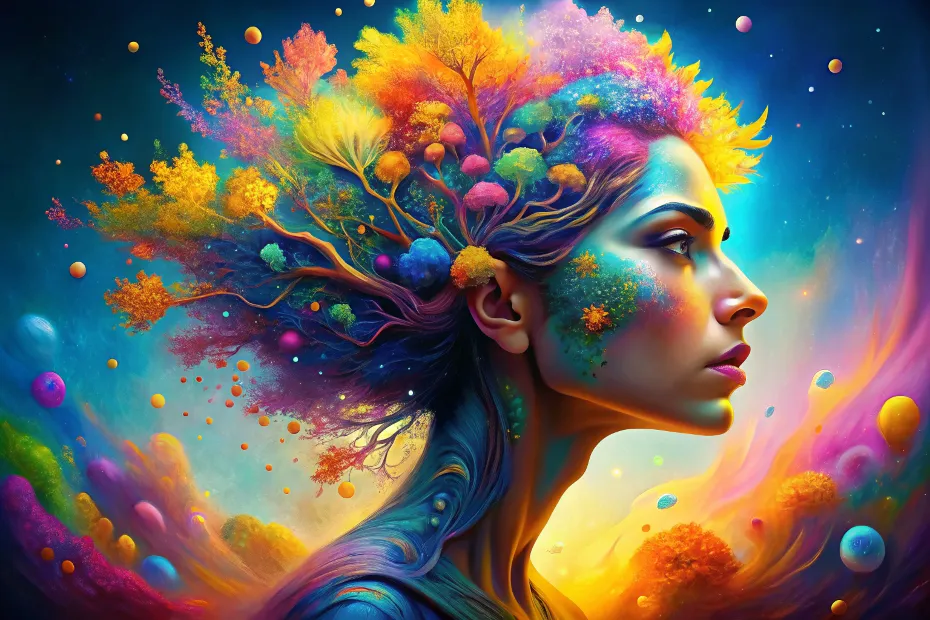In today’s rapidly changing world, the ability to think creatively is not only a valuable asset but a necessity. Creativity empowers us to navigate the complexities of life, find innovative solutions to challenges, and unlock our fullest potential for personal growth. However, fostering creativity is not always an easy task, as it requires breaking free from conventional thinking patterns and embracing a mindset of curiosity, exploration, and fearlessness. In this article, we will delve into strategies for cultivating creativity and harnessing its power to enhance problem-solving skills and drive personal development.
Understanding Creativity
Creativity is often defined as the ability to generate novel and valuable ideas, solutions, or insights. It involves making connections between seemingly unrelated concepts, challenging assumptions, and exploring new perspectives. Creativity is not limited to the realms of art and design; it permeates every aspect of life, from problem-solving at work to finding creative solutions to everyday challenges.
One of the most significant benefits of cultivating creativity is its positive impact on problem-solving skills. By thinking outside the box and exploring unconventional approaches, we open ourselves up to a wider range of potential solutions. Creativity allows us to tackle complex issues from multiple angles, increasing the likelihood of finding effective and innovative resolutions.
Benefits of Cultivating Creativity
Aside from enhancing problem-solving capabilities, cultivating creativity offers numerous benefits for personal development. Engaging in creative pursuits fosters self-expression, boosts confidence, and nurtures a sense of accomplishment. Creativity encourages us to embrace our uniqueness and appreciate the beauty in diversity of thought.
Moreover, creativity plays a crucial role in innovation and adaptability. In an ever-changing world, the ability to think creatively enables us to anticipate and respond to new challenges effectively. By cultivating creativity, we equip ourselves with the resilience and flexibility to navigate uncertainty and seize opportunities for growth.
Barriers to Creativity
Despite the numerous advantages of fostering creativity, many individuals face barriers that hinder their creative expression. One of the most common obstacles is self-doubt and fear of failure. We may be hesitant to explore new ideas or take creative risks, fearing judgment or potential setbacks.
Additionally, societal pressures, rigid thinking patterns, and lack of exposure to diverse experiences can stifle creativity. Breaking free from these limitations requires a conscious effort to challenge our assumptions, embrace curiosity, and cultivate a growth mindset.
Strategies for Fostering Creativity
Fortunately, creativity is a skill that can be developed and nurtured through intentional practices and a supportive environment. Here are some strategies to help you cultivate creativity and harness its power for personal growth:
Embracing Curiosity and Exploration
Curiosity is the fuel that ignites creativity. By asking questions, exploring new ideas, and seeking out diverse perspectives, we open ourselves up to a world of possibilities. Cultivate a mindset of curiosity by engaging in activities that stimulate your sense of wonder, such as reading, traveling, or immersing yourself in new experiences.
Engaging in Diverse Experiences
Exposing yourself to a variety of experiences, cultures, and perspectives can broaden your horizons and challenge your preconceived notions. Seek out opportunities to engage with different art forms, engage in cross-cultural exchanges, or explore new hobbies and interests. By expanding your frame of reference, you prime your mind for creative connections and insights.
Mindfulness and Creativity
Mindfulness, the practice of being present and fully engaged in the current moment, plays a vital role in enhancing creativity. By quieting the constant chatter of our minds and cultivating a state of focused awareness, we create space for creative insights to emerge.
Practices such as meditation, yoga, or simply taking mindful walks can help you cultivate a sense of presence and clarity. When we are fully present, we are better able to notice subtle details, make unexpected connections, and tap into our innate creativity.

Encouraging Playfulness and Experimentation
Creativity thrives in an environment of playfulness and experimentation. Embrace a childlike sense of wonder and curiosity by engaging in activities that encourage play and exploration. Experiment with new materials, techniques, or mediums, and allow yourself to make mistakes without judgment.
By letting go of perfectionism and embracing a spirit of playfulness, you create a fertile ground for innovation and creative breakthroughs. Approach challenges with a sense of curiosity and an openness to trying new approaches, even if they seem unconventional.
Building a Supportive Environment
Surrounding yourself with creative influences and like-minded individuals can play a significant role in nurturing your creativity. Seek out communities, workshops, or groups that share your creative interests or passions. Collaborating with others can spark new ideas, provide fresh perspectives, and offer valuable feedback and encouragement.
Additionally, curate your physical environment to foster creativity. Surround yourself with inspiring artwork, books, or objects that ignite your imagination. Create a dedicated space for creative pursuits, where you can freely explore and express yourself without distractions.
Practicing Creative Problem-Solving
Creativity is not merely confined to artistic endeavors; it can be applied to solve everyday challenges and enhance various aspects of your life. Adopt a creative mindset when approaching problems, whether at work, home, or in personal or social relationships.
Instead of defaulting to conventional solutions, challenge yourself to generate multiple creative alternatives. Engage in brainstorming exercises, seek out diverse perspectives, and embrace a growth mindset that welcomes new ideas and continuous learning.
Embracing Failure as a Learning Opportunity
One of the greatest obstacles to creativity is the fear of failure. However, by embracing failure as a valuable learning opportunity, you can cultivate resilience and foster a growth mindset that propels you forward.
Recognize that failures and setbacks are natural parts of the creative process. Instead of allowing them to discourage you, use them as stepping stones to refine your ideas, gain insights, and develop new strategies. Celebrate small victories and use failures as catalysts for growth and personal development.
The Role of Reflection
Self-reflection is an essential component of the creative process. Take time to reflect on your creative journey, evaluate your progress, and identify areas for improvement. Examine both your successes and failures, extracting valuable lessons and insights that can inform your future creative endeavors.
Journaling, engaging in self-reflection exercises, or seeking feedback from others can provide valuable perspectives and help you gain a deeper understanding of your creative process. By actively reflecting on your experiences, you can refine your approach and continue to grow as a creative individual.
Incorporating Creativity into Daily Life
Creativity is not confined to specific endeavors or pursuits; it can be infused into every aspect of your daily life. Seek opportunities to approach routine tasks with a creative mindset, whether it’s finding innovative ways to organize your workspace, experimenting with new recipes in the kitchen, or exploring unconventional solutions to household challenges.
By embracing creativity in the mundane, you cultivate a mindset that sees potential for growth and innovation in every situation. Draw inspiration from the world around you, and let your creativity flourish in unexpected ways.
Measuring Progress and Growth
As you embark on your journey of cultivating creativity for personal growth, it’s essential to measure your progress and celebrate milestones along the way. Define specific goals and benchmarks that align with your creative aspirations, whether it’s completing a creative project, developing a new skill, or achieving a personal breakthrough.
Celebrate your achievements, no matter how small, as they serve as motivators and reminders of your creative potential. Reflect on the personal growth you’ve experienced through your creative endeavors, and use this insight to set new challenges and continue pushing the boundaries of your creativity.
Challenges and Solutions
Fostering creativity is not without its challenges. Creative blocks, self-doubt, and external pressures can sometimes hinder your progress. When faced with these obstacles, it’s essential to have strategies in place to overcome them.
Seek inspiration from others, engage in creative exercises or prompts, and embrace a mindset of self-compassion. Remember that creative blocks are temporary, and by persevering and exploring new approaches, you can reignite your creative spark.
Additionally, prioritize self-care and ensure that you’re nurturing your mental, physical, and emotional well-being. A balanced lifestyle can provide the energy and clarity needed to sustain your creative endeavors.
Cultivating creativity is a lifelong journey
Cultivating creativity is a lifelong journey that offers countless opportunities for personal growth, problem-solving, and self-expression. By embracing curiosity, engaging in diverse experiences, practicing mindfulness, and fostering a supportive environment, you can unlock your creative potential and harness its power to navigate life’s challenges with innovative solutions.
Remember, creativity is not a finite resource; it is a muscle that can be strengthened and nurtured through consistent practice and dedication. Embrace the process, celebrate your successes and failures alike, and allow your creativity to flourish as a catalyst for personal growth and fulfillment.
FAQ
- How can I overcome creative blocks? Creative blocks are common but can be overcome by taking breaks, seeking inspiration from diverse sources, and experimenting with new techniques.
- Is creativity limited to artistic pursuits? No, creativity extends to all aspects of life, including problem-solving, innovation, and personal development.
- Why is mindfulness important for creativity? Mindfulness promotes a state of awareness and presence, allowing individuals to access their creative intuition and overcome mental barriers.
- How can I cultivate a supportive creative environment? Surround yourself with like-minded individuals, seek feedback and collaboration, and create a space that fosters brainstorming and experimentation.
- What role does failure play in the creative process? Failure is a natural part of creativity and should be embraced as a learning opportunity. It provides valuable feedback and encourages growth and resilience.

